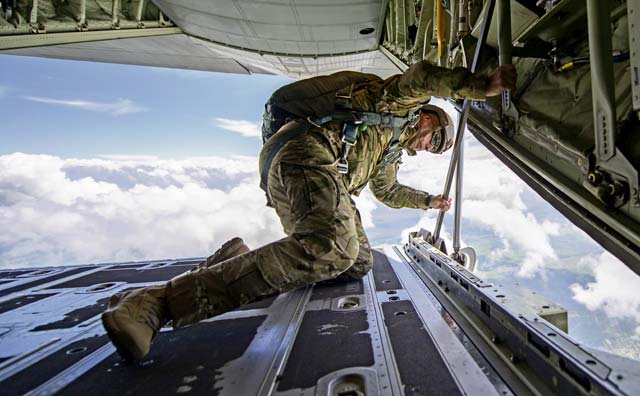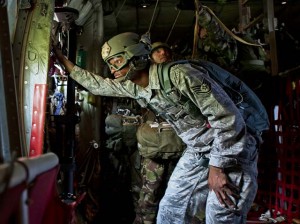
BUCHAREST, Romania — More than 80 U.S. Airmen and Soldiers stationed in Germany came together to take part in the Carpathian Spring 2014 May 9 through 23 here.
Carpathian Spring is an annual training opportunity that allows C-130J Super Hercules aircrew to fly in less restrictive airspace, allowing them to utilize night vision goggle capabilities and fly in low level formations.
“This training is important, because Romanian airspace allows us to be very flexible and helps to keep us proficient,” said U.S. Air Force Capt. Chad Thompson, 37th Airlift Squadron pilot. “We’re performing daytime visual, mountain low level training, where we fly low through the mountains to practice threat avoidance and forcible entry capabilities. We’re also doing air-drop training with container delivery systems and Romanian paratroopers. At night we’re doing NVG flying and landings.”

The opportunity to fulfill training requirements was essential for all personnel, but more importantly, the two week-long training allowed service members to interact with their Romanian allies. Members from both militaries shared their perspectives and expertise, improving mission planning and tactics.
“I’ve learned how U.S. pilots can perform in tactical exercises and how they manage a paratrooper mission,” said Romanian air force 1st Lt. Gheorghe Matis, C-27J pilot in training. “I was very impressed. These kinds of training opportunities prepare us for real missions. This has been my first time working with Americans. I hope there are more chances in the future to take this cooperation to a higher level, because we have a lot to learn from each other.”
Pilots from the 37th AS also shared similar sentiments.
“It’s important to work with the Romanians, because they’re one of our NATO Allies,” Thompson said. “They’re hard working and have been accommodating, letting us bring our C-130s and opening their airspace to allow us to train better together.
“Working closely together during these types of flying training deployments helps increase our thriving relationship with the Romanians,” he added.
Along with conducting flying training missions, Romanian paratroopers were also able to fulfill their jump requirements. Above Romanian drop zones, C-130J pilots, loadmasters and U.S. Air Force and Army jumpmasters worked together with Romanian paratroopers to ensure safety during static-line jumps and high-altitude low-opening jumps.
“We’ve been here providing jumpmaster support,” said U.S. Air Force Staff Sgt. Christopher Zavala Romero, 435th Contingency Response Group jumpmaster. “We have helped push out 300 Romanian paratroopers in the past two weeks. Part of our job is to make sure jumpers and the aircraft are both safe. This training ensures we’re on the same page when we work with our allies.”
Once aircrews completed their missions, Airmen from the 86th Aircraft Maintenance Squadron were ready to do their part. The maintainers worked 12-hour shifts to keep the C-130J flight ready.
“For two weeks our teams have been launching aircraft for day and night missions and fixing them when they return,” said U.S. Air Force Staff Sgt. Jereamy Day, 86th AMXS guidance and control craftsman. “Delivering aircraft that can perform the mission is why we’re here.”
The 86th Airlift Wing mission is only successful with every piece working together, the same way joint operations are successful with partnerships built during trainings such as Carpathian Spring.
Team Ramstein has participated in Carpathian Spring since 2008, showing the Air Force’s continued commitment to NATO Allies.


